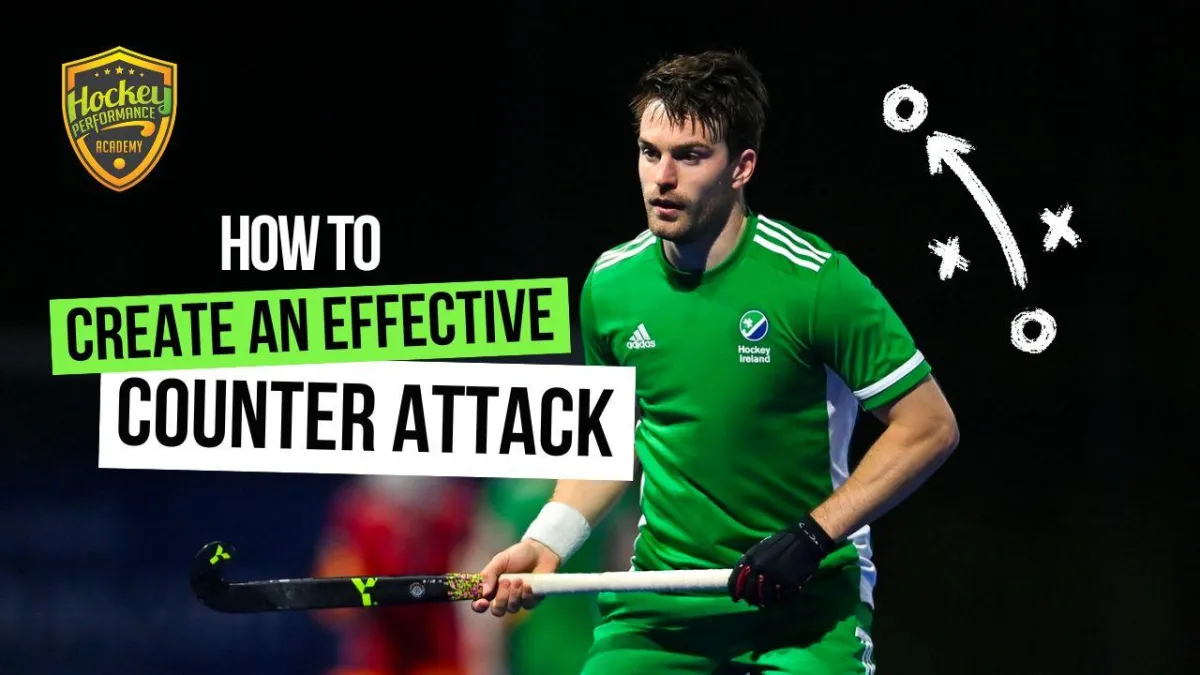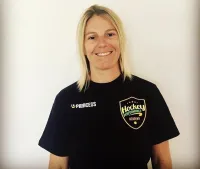
Capitalise On Oppositions Mistakes And Create An Effective Counter-Attack in Field Hockey
How often do you capitalise on the oppositions mistakes, especially when you get an unexpected turnover in a hockey game?
The opposition may make a poor pass that comes straight to us (which is always a bonus) but it's up to us to punish them for that mistake by creating an effective counter-attack.
Here is an example of how to capitalise the oppositions mistakes and create an effective counter-attack in field hockey, both as the ball carrier and as a player ahead of the ball.
Here is a summary of the key points:
1. Get Ahead Into Space
Upon turnover, use your body to protect the ball, try to move the ball ahead of your defender and accelerate into an open space.
2. Assess The Situation
As turnovers sometimes come unexpected try to get your eyes up while carrying the ball by placing the ball ahead of your feet, which will allow you to look up and assess the situation ahead.
You could be looking at where the defenders are positioned, where your team mates are and where is the best place is to move the ball into.
For example: can I create a 2 v 1 situation or do I need to carry?
3. Angle Your Run To Create Numbers Up
Once you've assessed the situation you can angle your run according to where the space is or what you want to do next.
If you're in a 2 v 1 situation, try to engage the defender by running at them or running towards them at an angle that could pull them away from the dangerous area's of the field (i.e. the middle).
4. If The Defender Holds Off, Keep Going.
A good defender probably won't commit to you immediately and they will probably hold off so the early pass isn't always on.
If the defender holds the inside, keep going until they start to engage and commit to you.
5. Once The Defender Commits, Pass.
As the defender engages closer and start to commit to you, you can pass either to your team mate if they're available or you can play a waited pass into space for them to run onto.
It is helpful to try pass off the defender’s left foot as it makes it harder for them to make a tackle or interception.
6. Anticipate The Pass & Accelerate Into Space
As the receiver of the pass you want to anticipate the pass and time your lead to when the defender start to engage.
Once you see the pass is coming, accelerate into space to get to the ball quickly.
7. One Touch Lifted Shot
Recognise the situation ahead to determine your next move, so that you're aware of how much time and space you have. For example: do I have time to receive or does it need to be a one touch move?
In the example above, the striker sees that the goalkeeper is coming out of his box so he decides to use a one touch lifted slap to get the ball over the keepers right shoulder.
I hope you can use these tips to capitalise on counter-attacks in field hockey.
WANT TO REACH THE NEXT LEVEL IN YOUR HOCKEY?
I've put together a FREE 20 min training video sharing the 4 Steps To Get Noticed In Hockey, including how to avoid the same mistakes that I made (and that many others make too) when striving to reach a higher level in hockey.

Get the 4 Steps To Get Noticed FREE Training HERE
For more hockey tips and training DOWNLOAD OUR FREE mobile app using the buttons below



Capitalise On Oppositions Mistakes And Create An Effective Counter-Attack in Field Hockey
How often do you capitalise on the oppositions mistakes, especially when you get an unexpected turnover in a hockey game?
The opposition may make a poor pass that comes straight to us (which is always a bonus) but it's up to us to punish them for that mistake by creating an effective counter-attack.
Here is an example of how to capitalise the oppositions mistakes and create an effective counter-attack in field hockey, both as the ball carrier and as a player ahead of the ball.
Here is a summary of the key points:
1. Get Ahead Into Space
Upon turnover, use your body to protect the ball, try to move the ball ahead of your defender and accelerate into an open space.
2. Assess The Situation
As turnovers sometimes come unexpected try to get your eyes up while carrying the ball by placing the ball ahead of your feet, which will allow you to look up and assess the situation ahead.
You could be looking at where the defenders are positioned, where your team mates are and where is the best place is to move the ball into.
For example: can I create a 2 v 1 situation or do I need to carry?
3. Angle Your Run To Create Numbers Up
Once you've assessed the situation you can angle your run according to where the space is or what you want to do next.
If you're in a 2 v 1 situation, try to engage the defender by running at them or running towards them at an angle that could pull them away from the dangerous area's of the field (i.e. the middle).
4. If The Defender Holds Off, Keep Going.
A good defender probably won't commit to you immediately and they will probably hold off so the early pass isn't always on.
If the defender holds the inside, keep going until they start to engage and commit to you.
5. Once The Defender Commits, Pass.
As the defender engages closer and start to commit to you, you can pass either to your team mate if they're available or you can play a waited pass into space for them to run onto.
It is helpful to try pass off the defender’s left foot as it makes it harder for them to make a tackle or interception.
6. Anticipate The Pass & Accelerate Into Space
As the receiver of the pass you want to anticipate the pass and time your lead to when the defender start to engage.
Once you see the pass is coming, accelerate into space to get to the ball quickly.
7. One Touch Lifted Shot
Recognise the situation ahead to determine your next move, so that you're aware of how much time and space you have. For example: do I have time to receive or does it need to be a one touch move?
In the example above, the striker sees that the goalkeeper is coming out of his box so he decides to use a one touch lifted slap to get the ball over the keepers right shoulder.
I hope you can use these tips to capitalise on counter-attacks in field hockey.
WANT TO REACH THE NEXT LEVEL IN YOUR HOCKEY?
I've put together a FREE 20 min training video sharing the 4 Steps To Get Noticed In Hockey, including how to avoid the same mistakes that I made (and that many others make too) when striving to reach a higher level in hockey.

Get the 4 Steps To Get Noticed FREE Training HERE
For more hockey tips and training DOWNLOAD OUR FREE mobile app using the buttons below



